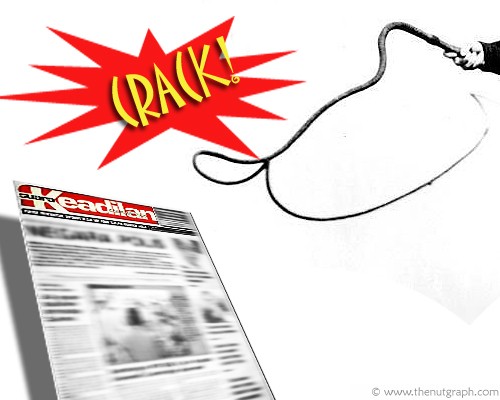
WHOM should the media be accountable to – the public or the government? Judging from the Home Ministry’s refusal to renew the permit of Parti Keadilan Rakyat (PKR) newspaper Suara Keadilan, it appears the government is still intent on making the media answerable to it. The ministry was apparently “not satisfied” with Suara Keadilan’s response to a show-cause letter over an article headlined Felda Bangkrap, which the Federal Land Development Authority (Felda) has said is defamatory.
It does indeed appear that Suara Keadilan’s headline was inaccurate. Although Felda’s cash reserves have dwindled from RM4.08 billion in 2004 to RM1.35 billion in 2009, there isn’t any evidence that it is currently bankrupt. Clearly, Suara Keadilan was being mischievous, likely because of its own political agenda.
But should the government be responsible for keeping the media accurate? Can the Malaysian government, or any government, be entrusted to monitor the media fairly while ensuring that freedom of expression is respected? And if the government doesn’t play the role of media police, who will keep the media in check if it perpetuates inaccurate or even false or malicious reporting?
Expression and governments
Governments are, rather notoriously, not always the best defenders of freedom of expression. As governments have vested interests in maintaining power, it may prefer to blot out reports that may cause the public to look upon it unfavourably. The North Korean live telecast of the team’s World Cup match against Portugal, for example, was reportedly cut short when the score was 4-0. Portugal eventually won 7-0.
The Malaysian government is also capable of using media reports to show itself in the best light possible. As highlighted previously in The Nut Graph, the Bernama headline on a United Nations report on detainees in Malaysia was miles apart from that of the Associated Press (AP). Government-controlled Bernama chose to quote a section of the report saying the detainees were “treated well”, whereas the AP highlighted findings of police torture and abuse of suspects to obtain confessions.

Doubts can also be raised about the Barisan Nasional government’s ability to remain impartial when tasked with policing the media. One could question, for example, why Utusan Malaysia was not similarly penalised when it published an incorrect report blaming the DAP’s Teresa Kok in a controversy over the azan. The report insinuated that Kok had called for the lowering of the azan volume at a Bandar Kinrara mosque. This was later found to be untrue. Kok, however, was detained without trial under the Internal Security Act (ISA) for seven days and questioned about the alleged incident.
The Home Ministry was also comparatively gentle when handling Suara Perkasa’s controversial call for MCA Youth chief Datuk Dr Wee Ka Siong to be detained under the ISA. The publication was only given a warning. Perchance because Perkasa is led by Datuk Ibrahim Ali, who is widely seen to be Umno-friendly and has support from Umno leaders?
Governments may also not be the best media police due to their tendency to please their voter base. Such considerations could explain why monthly magazine Al-Islam did not face any suspension despite its disrespectful undercover report on a Catholic mass and the eucharist. The magazine did issue a public apology, but only 10 months later because of public outrage.
Public accountability
So if governments aren’t the best organs to keep the media in check, who would be a better candidate?
We would – that is, we, the public. There are enough tools available to the public for it to ensure that the media does not get away with publishing inaccurate reports, some of which are listed below.
a) Credibility
In a mature democracy, a news outfit’s credibility would be its greatest asset. In a vastly competitive industry, media that get crucial facts wrong and fail to adequately correct their mistakes and apologise would have to contend with a disbelieving public. Ultimately, a disbelieving public will result in diminishing readership or viewership.
A vigilant public can also write or call in and correct the media when they get their facts wrong. Publishing corrections is standard practice in many international newspapers. There are even blogs by conscientious members of the public that monitor the accuracy and completeness of such corrections.
Instead of fearing the government’s long arm, the media should be more fearful of an intelligent public, ready to switch loyalties when encountering careless reporting.
b) Defamation suits

For serious mistakes that harm reputations, there is always the option of taking a media outfit to court. Freedom of speech does not mean that the media has absolute freedom to publish false news. Even tabloids can be reined in. For example, Brad Pitt and Angelina Jolie sued News of the World for saying in January 2010 that they were splitting up and had seen a divorce lawyer.
The Malaysian courts are also no strangers to defamation suits. Kok, for example, has sued Utusan Malaysia and columnist Mohd Zaini Hassan for RM30 million for publishing the azan story. The MCA’s Datuk Michael Chong filed a RM10 million suit against Guang Ming Daily for dubbing him “Ah Long King”. And no less than Prime Minister Datuk Seri Najib Razak has vowed that Felda will sue Suara Keadilan for RM200 million for its mischievous headline.
Newspapers could defend themselves by saying, for example, that their report was true or that it was fair comment on a matter of public interest. Potential hefty damages awarded against irresponsible reporting are themselves a deterrent against inaccuracy. Provided, of course, the courts are fair and impartial in meting out justice.
c) Public dialogue
The beauty of freedom of speech is that the injured party has the liberty to publicly refute inaccurate statements, especially in this day and age when individuals can self-publish. They can also call on the offending media to produce proof of their claims. Respected international newspaper The Economist regularly publishes letters from its readers criticising its own articles. Online news sites often invite readers to comment and interact with its writers, as well as with one another, on any given article.
Rather than the government having to step in and dictate what’s right and what’s not, the public should be given the freedom to listen to different arguments and conclude for themselves which are the most cogent and convincing.
The setting up of a media council, minus the current restrictive laws, is also an option that has been previously discussed.
Growing up
It’s really time Malaysia grew up and our government stopped trying to position itself as a protective big brother. The public should be given more credit in being able to distinguish between credible media and inaccurate ones. There is no need for the government to take draconian steps such as cancelling permits, or even requiring publishing licences for newspapers in the first place.
The only role the government could actively play is taking action under the Penal Code for published or broadcast reports that incite violence or threaten particular groups. Such state action would clearly serve the public’s interest instead of its own political goals. Apart from that, the government would do the Malaysian public more good if it just stopped meddling with the media. ![]()
[related-posts]
The Nut Graph needs your support


m.k. says
Just throw them out at GE13! Full stop.